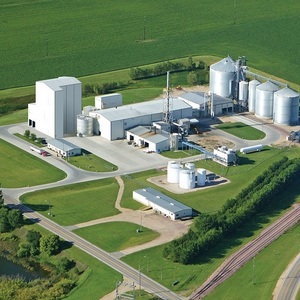Gevo to produce isobutanol and ethanol simultaneously

Gevo Inc.
March 26, 2014
BY Erin Krueger
Gevo Inc. has released 2013 financial results, reporting total revenues of $17.91 million for the year, down from $32.41 million in 2012. The company reported a gross loss of $9.69 million, compared to $8.03 million the previous year. Gevo also announced it is transitioning it Luverne, Minn., plant to the production of both isobutanol and ethanol.
In press release announcing the results, Gevo attributed the decision to produce both fuels to the steady progress made in executing the company’s flexible production technology strategy and the high ethanol margin environment. According to Gevo, producing both ethanol and isobutanol allows the company to fully utilize the Luverne plant and increase cash flow as it continues to commercialize its isobutanol capabilities.
Advertisement
Advertisement
During a call to discuss the results, Gevo CEO Pat Gruber elaborated, noting the company has made a great deal of progress moving through the isobutanol commercial process learning curve. “Fundamentally, our technology works at scale with corn mash—the feedstock—and we are in the midst of learning how to run the integrated full-scale isobutanol process,” he said. “As we have advanced on the curve, we have discovered that the isobutanol technology not only works, but can work concurrently with producing ethanol.”
While Gevo’s original vision was to focus on one product, Gruber said the company is now confident it can leverage the flexibility of its technology to more fully utilize all the operating units of the plant to produce both ethanol and isobutanol simultaneously. “Needless to say, the additional cash flow is a benefit…as we scale up the technology,” he said. According to Gruber, three of the plant’s four fermenters will produce ethanol, while the remaining fermenter will produce isobutanol.
In addition to increasing the available cash flow as Gevo optimizes its isobutanol production technology, producing ethanol and isobutanol concurrently is expected to improve the operational environment of the plant for the optimization of isobutanol production by creating a continuous, stable mash flow and consistent recycle of water back to the fermenters. According to information released by the company, it also broadens the potential market to license, as partners increasingly see the benefit of coproducing both fuels at as single site.
Advertisement
Advertisement
With regard to the isobutanol production process, Gruber noted Gevo has made a lot of process on learning how to run the process at scale. He said the company has commissioned its proprietary system to sterilize corn mash, and has proved that its isobutanol-producing yeast and GIFT system work at commercial scale with corn mash. To date, the company has also achieved up to 71 percent of its targeted gallons per batch goal and produce isobutanol that met quality standards. Gruber also said that the company has demonstrated that it can manage infections during fermentation, achieving more than 100 percent of its goal, although not with the consistency or reliability that is needed. All of the facility’s fermenters and GIFT systems have operated and performed as expected. In addition, the plant has begun the integration of the water recycle streams and has achieved greater than 90 percent water recycle in fermentation.
Recent achievements highlighted in the financial release include the March 6 announcement that a letter of intent has been signed with Porta Hnos S.A. under which the Argentina-based ethanol producer would become the exclusive licensee of GIFT in that country to produce isobutanol. During the fourth quarter of last year, Gevo began selling biobased isooctane made from its isobutanol for specialty fuel applications, such as racing fuel. In December, the company announced the U.S. Army successfully fuel a Sikorsky UH-60 Black Hawk helicopter on a 50/50 blend of its ATJ-8 fuel. The same month, Gevo announced that Underwriter Laboratories had approved the use of up to 16 percent isobutanol in UL 87A pumps.
Related Stories
The USDA’s Risk Management Agency is implementing multiple changes to the Camelina pilot insurance program for the 2026 and succeeding crop years. The changes will expand coverage options and provide greater flexibility for producers.
EcoCeres Inc. has signed a multi-year agreement to supply British Airways with sustainable aviation fuel (SAF). The fuel will be produced from 100% waste-based biomass feedstock, such as used cooking oil (UCO).
SAF Magazine and the Commercial Aviation Alternative Fuels Initiative announced the preliminary agenda for the North American SAF Conference and Expo, being held Sept. 22-24 at the Minneapolis Convention Center in Minneapolis, Minnesota.
Saipem has been awarded an EPC contract by Enilive for the expansion of the company’s biorefinery in Porto Marghera, near Venice. The project will boost total nameplate capacity and enable the production of SAF.
Global digital shipbuilder Incat Crowther announced on June 11 the company has been commissioned by Los Angeles operator Catalina Express to design a new low-emission, renewable diesel-powered passenger ferry.
Upcoming Events










